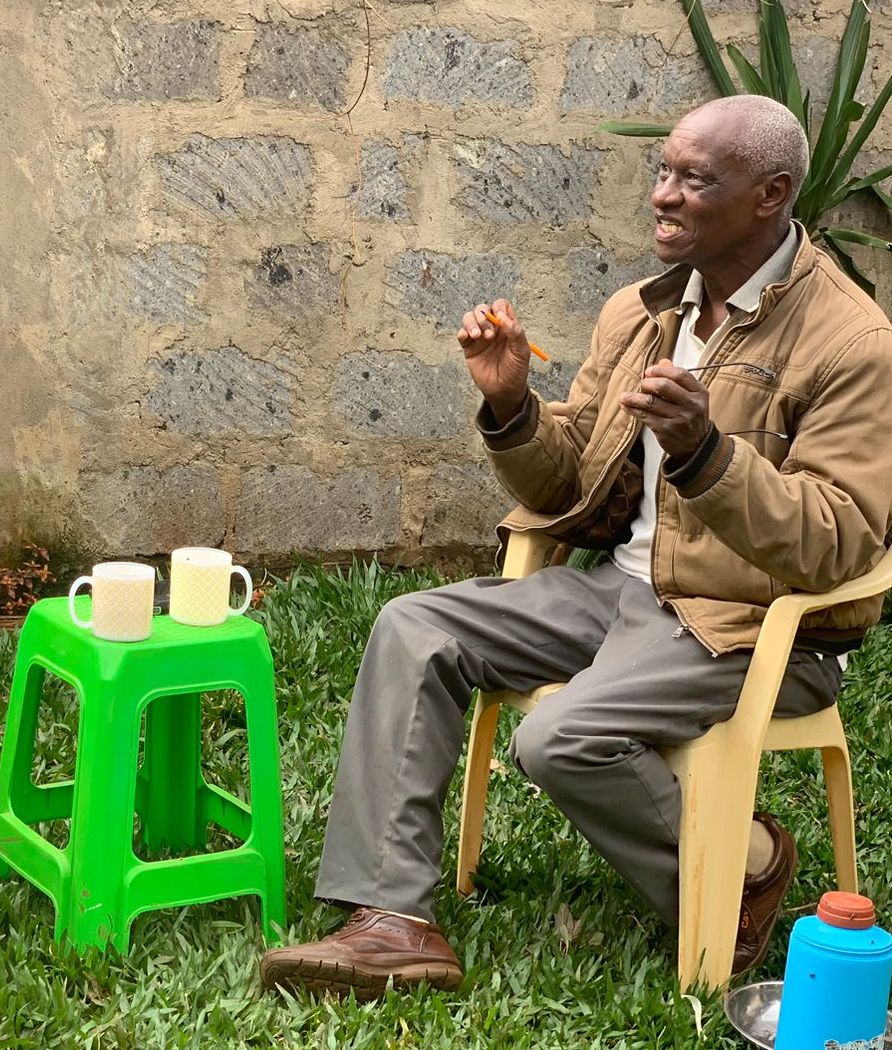Koert Lindijer has been a correspondent in Africa for the Dutch newspaper NRC since 1983. He is the author of four books on African affairs.
Kimani Charagu Kaigai (66) reclines upon the tender grass, which serves as the gathering spot for old men. Meanwhile, his wife assumes a crouched position amidst the curious geese, diligently tending to the premises. In a playful manner he says” “Do you think I should take a second wife”. She decisively waves away his comment: “I can still handle the housework very well.” Kimani says triumphantly: “Do you see how strong the traditions still are? The answers to the challenges of the present lie in the past.”
In Kenya, there is a growing challenge to long-standing beliefs, particularly those related to male dominance, as women’s emancipation gains momentum. Despite the fact that the majority of families continue to view men as the ultimate authority, there is a noticeable trend towards women leading independent lives without male companionship. The demographic shifts are evident in the statistical data. According to the recently released Kenya Demographic Health Survey, the proportion of households headed by single mothers has increased to 31 percent in urban areas and 36 percent in rural areas. These changes have come as a surprise to many Kenyans who were raised in a culture of ubuntu, where communal values were deeply ingrained and men held a prominent position. As a result, many Kenyan men are experiencing a sense of emasculation.
Jacob Aliet wrote his book, Unplugged: Things Our Fathers Did Not Tell Us, in response to the concern over the diminishing male superiority. During a recent television appearance, he argued that the teachings of the West have been erroneous and perilous, leading to an excessive empowerment of women. Aliet advocates for the restoration of men’s prominent role in society and his book serves as a guide for men to reclaim their masculinity. “Women have taken far too much charge, and we must take back our prominent role. My book teaches men to be men again”, he said.

People with small brains
There are Kenyans who go as far as referring to a widespread crisis among men. “Kenyans are currently experiencing a significant societal transformation.,” says psychologist Christina Lenjou (44) in the modern capital Nairobi. “The prevalence of liberal attitudes is eroding long-standing traditions, resulting in men losing their authority, their purpose, and their self-respect, ultimately leading them to refrain from assuming leadership roles”. Conversely, women assert that they can achieve anything without the presence of a man.(see earlier story on theafricanists: https://theafricanists.info/without-a-man-everything-is-possible/)
Thirty years ago, then-President Daniel arap Moi called women “people with small brains.” In his Kenya there was hardly any room for women in politics or business. At that time Kenya was devoid of substantial Western influence, lacking access to the internet and foreign television. Furthermore, the country did not experience the impact of rebellious pop music and soul. The younger generation instead exhibited a profound reverence towards their elders, displaying a sense of deference and timidity.
During the economic revival after the turn of the century, the entrenched role pattern began to change and a kind of cultural revolution ensued. The forces of globalization, individualization, and consumerism are progressively encroaching upon the traditional African sense of comfort and familiarity.
Nowadays, women can often be found in the leadership in politics, the arts and business sectors. The television news is presented every evening by strikingly sexy dressed ladies. Under President Moi, bikini-clad dancing ladies in the African American music show Solid Gold had caused such a stir that parliament devoted a debate to it and Moi banned the program.
In addition to the changing division of roles between men and women, the once strictly separated age sets are also crumbling and with them the authority of the elderly. In the past, when they beat the sacred drums, everyone fell under their magical spell. Now everyone has their own individual dream to fulfill and no longer feel that magic.
In contemporary society, the traditional practice of instilling young men with the expectation of assuming leadership roles in the family has significantly diminished. Instead, a prevalent issue arises where these individuals frequently find themselves unable to support a family due to prevailing poverty. Alex Maina, a 34-year-old resident of a slum area, articulates his predicament by stating, “I remain unmarried as I am uncertain of my ability to adequately provide for my future family. This unfortunate circumstance deeply troubles me, as it erodes what little remains of my personal dignity. Regrettably, such distressing thoughts occasionally lead me to contemplate suicide.”
Kikuyu

Kenya is conservative, or rather: most Kenyans adhere to their tribal traditions. Kimani Charagu Kaigai, sitting among the green banana trees in Kikuyu area, appeals to deep tribal instincts because, according to him, humanity has lost its way.
Kimani represents the traditional argument, frequently he convenes with male peers on the tender grass to discuss the customs of old. He attributes the increasing prevalence of fatherless families among the Kikuyu, one of Kenya’s tribes, to the neglect of their spiritual disposition. “Our disregard for our spirituality, which is the fundamental aspect of our identity, is the root cause of issues such as homosexuality, alcoholism, fatherless families, and sugar daddies. These are all Western concepts that are undermining our societal order.”
Can a Kikuyu woman get married before her older sister does? Certainly not in the past and these days not without offending part of her family. Can a man decide not to be circumcised? “No,” Kimani says firmly. “Something is going wrong in your life if you do not keep such commandments. Spirituality has no logic. When families are led by women, when women become stronger than men, things go wrong. That is not the order in which nature created us.”
The sense of discomfort is not confined to staunch conservatives such as Kimani. Robert Ochola hails from ‘Da Hood’ and works as a social worker in one of Nairobi’s impoverished neighborhoods. “Many young people complain that men have no balls anymore,” he jokes. “Women are favored by politicians and foreign aid organizations. Too much emphasis has been placed on their situation, they have been given more opportunities in education and on the labor market, it is favoritism. Things have been turned upside down.”
Kamba
Located in a sandy terrain adorned with iconic baobab trees, the village of Nthongoni is situated approximately four hours’ drive southeast of Nairobi. It serves as the residence of the Kamba community. Within this community, the Mutanu secondary school stands as an educational institution where Head-Teacher Mutie Luciano Wambua diligently provides tutoring sessions on Saturdays. Not all students showed up on this day because parents cannot pay the school fees. “We have many children from families with only one parent. They feel lonely without a father and isolate themselves from other children,” he says. “Who disciplines the children when the father is absent, what becomes of our ubuntu when the unity of the family is undermined?”
Alice Samuel, a female colleague, agrees. “You simply show more respect to a man than to a woman. In our culture the man is a demigod, he frightens you. I am a woman, but I regret that men no longer fulfill their powerful role these days.”
The headteacher continues: “In the past it was the first-born boy who would lead the family, he was assigned all the powers. Now it is the well-educated members of the family who call the shots. Now women can also inherit, there are lawyers in all villages to assist them with this.”
Three girls at Nthongoni school have a sugar daddy, says Alice Samuel. That is a financial sponsor of an older age in exchange for sex and other entertainment. “We have such a sugar daddy in our village, a 35-year-old man who has sex with a 14-year-old girl. The parents know about it, the sugar daddy also has a relationship with her mother.” A study published a few years ago in Kenya by communications company Well Told Story showed that two out of three respondents did not think it was a problem if someone had a rich lover, whether secret or not. One in three had such a ‘sponsor’ themselves. But guys feel like the market for finding a good woman is being ‘ruined’ by old rich guys or others higher up the socio-economic ladder. And this also undermines their masculinity.
New African identity
Back in Nairobi, psychologist Christina Lenjou shrugs off traditionalist Kimani Charagu Kaigai’s longing for a purely African past. However, she thinks it would be good to filter foreign liberal influences. “Something of our old social order must continue to exist, the mutual solidarity that brought security, you cannot replace that by exchanging WhatsApp messages,” she says. “The new, competitive society makes us too individualistic and we experience liberal morality as intrusive and not suitable for Africa. We must look for a new African identity.”
Because Christina Lenou is receiving more and more clients with psychological disorders in her practice. They cannot keep up with the changes. Men as well as women. “They all want that man’s pedantic finger back,” she says. “Because deep down, a woman seeks the authority of the man.”
This article was first published in NRC on 17-10-2023

